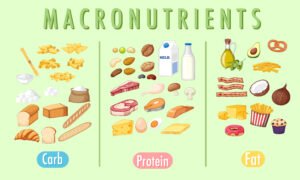In a world where quick fixes and instant gratification often take precedence, our daily food choices are a beacon of control over our health and vitality. This is especially true for health enthusiasts focused on their well-being and busy professionals juggling a packed schedule. Wise food choices can translate to improved energy levels, concentration, and endurance – non-negotiable in today’s high-paced lifestyle.
Not all food is created equal. Some leave you feeling sluggish and hungry sooner, while others provide a lasting fuel that keeps you active throughout the day. The question then becomes, “How do you choose foods that can optimize your health and suit your lifestyle?”
In this blog, we will explore the key factors to consider when making smart food choices and discuss how these decisions can positively impact our health and lifestyle.
1. Understanding Your Nutrients:
Your body is a sophisticated machine which requires conscious food choices and spectrum of nutrients to flourish. These can be broadly categorized into macronutrients – carbohydrates, proteins, and fats – which supply the energy your body needs, and micronutrients – vitamins and minerals – essential for growth, development, and overall health.
a. Macronutrients 101
- Carbohydrates: Often labelled as the body’s preferred energy source, carbs come in simple (sugars) and complex (starches and fibres) forms. They are found in various foods, including fruits, vegetables, whole grains, and legumes.
- Proteins: Made up of amino acids, proteins are the building blocks of the body, crucial for muscle repair and growth, immune function, and more. High-quality sources include meat, fish, dairy, and plant-based options such as legumes and soy products.
- Fats: Despite their reputation, there are healthy fats which are essential for your body’s function and should not be avoided. Monounsaturated and polyunsaturated fats (including omega-3 and omega-6 fatty acids) help with brain health, cell function, and hormone production. These are found in avocados, nuts, seeds, and certain oils. Understanding how to interpret food labels can help us make informed decisions.
b. Micronutrients Matter Too
- Vitamins: These organic compounds are vital for various functions. These support vision (vitamin A), forming red blood cells (vitamin B12), and healing wounds (vitamin C). A well-rounded diet with plenty of fruits and vegetables typically provides health benefits.
- Minerals: Unlike vitamins, minerals don’t contain carbon and are inorganic. Minerals like calcium and magnesium are critical for bone health and nerve function and are present in dairy products, leafy greens, and nuts.

Read More: How Many Calories Does Weight Lifting Burn? Debunking the Myths
2. The Building Blocks of Smart Nutrition Choices:
Making smart food choices is a multifaceted endeavour that involves more than counting calories. Here are several critical factors to consider as you build a nourishing diet plan.
a. Caloric Consciousness
Calories measure the potential energy in food. Consuming more calories than your body needs can lead to weight gain while consuming fewer can cause weight loss. For healthy weight maintenance, it’s essential to balance the energy you eat with the energy your body uses, considering your age, gender, weight, height, and level of physical activity.
b. Portions and Moderation
Understanding portion sizes can be pivotal. Eating the right portions ensures that you consume the appropriate amount of calories, helping you maintain a healthy weight and reducing the risk of overeating, which can lead to chronic diseases.
c. The Power of Whole, Unprocessed Foods
Seek out foods that are as close to their natural state as possible. Whole foods are typically higher in nutrients and fibre and lower in additives, preservatives, and added sugar. For example, choose an apple over apple juice, whole grains over refined ones, and fresh vegetables over canned with added salt.
d. Deciphering Food Labels
Labels can be deceiving if you don’t know what to look for. Key areas to focus on include serving size, the number of servings in the package, and the macronutrient breakdown. Be cautious of added sugars, excessive sodium, and ingredients you can’t pronounce or recognize.
Read More: What are Net Calories: The Key to Effective Weight Management
3. In Practice: Daily Strategies for Smarter Eating
While theoretical knowledge is crucial, the real test is translating that knowledge into daily habits. Here’s how to practically incorporate these principles into a bustling schedule.
a. Mastering Meal Prep for Efficiency
Prepare your meals ahead of time to save both time and mental energy during your busy workweek. Invest a few hours during the weekend to cook large batches of staple foods, like grains, proteins, and vegetables, that you can easily mix and match into various meals.
b. Smart Snacking on the Move
Healthy snacks can keep your energy levels stable throughout the day. Instead of vending machine finds, opt for nutrient-rich options such as nuts, seeds, fresh fruits, and yoghurt. Keep single portions in your bag or desk to have a go-to when needed.
c. Dining Out Without Derailing
Even when eating out, you can make wise choices. Look for vegetables, lean proteins, and complex carbs on the menu. Request dressings and sauces on the side to control the portion you consume, and ask your servers for healthier preparation methods, like grilling instead of frying.
Choosing healthier food options is crucial for a balanced diet and a healthier lifestyle. It involves selecting foods low in added sugars and unhealthy fats and rich in nutrients, such as whole grains, lean proteins, fruits, and vegetables. While there are many benefits to such choices, prioritizing healthy options also comes with challenges and considerations.
Read More: Is it Possible to Build Muscle in a Calorie Deficit?
4. Pros and Cons of Prioritizing Healthy Options:
Prioritizing healthy options while making informed food choices has pros and cons, but the benefits generally outweigh the drawbacks. Here’s a look at some of the pros and cons:
a. Pros:
- Improved Health and Well-being: Healthy eating habits supports overall health, reducing the risk of chronic diseases like heart disease, diabetes, and cancer.
- Weight Management: Opting for nutrient-rich foods over high-calorie, low-nutrient options can help maintain a healthy weight.
- Enhanced Energy Levels: A diet rich in whole foods provides steady energy throughout the day, avoiding the spikes and crashes associated with sugary and fatty foods.
- Better Digestive Health: High-fiber foods, such as fruits, vegetables, and whole grains, improve gut health and prevent digestive issues.
- Positive Environmental Impact: Choosing plant-based options and whole foods often has a lower environmental footprint than processed and packaged foods.
b. Cons:
- Higher Cost: Making food choices especially organic and diet items, can be more expensive than processed foods.
- Limited Availability: Accessing a wide variety of healthy foods can be challenging in some areas due to limited availability in local stores.
- Time Commitment: Preparing fresh, healthy meals can require more time for shopping, preparation, and cooking.
- Social and Cultural Challenges: Social events and cultural norms often revolve around less-healthy food options, making it challenging to stick to healthy choices.
- Flavour Adjustments: Some individuals may find it challenging to adjust to the flavours of whole foods after being accustomed to the strong tastes of processed foods, fast food and added sugars.
5. In Conclusion: Your Diet, Your Power
In conclusion, prioritizing healthy options when making smart food choices is essential for supporting overall health and well-being. Your diet is a realm where you exercise your power. Each bite is a decision that can either deplete your energy or enhance it.
By learning to make intelligent food choices, you reclaim control over your well-being, weight, and energy levels. Begin with small, manageable changes and take pride in their impact on your life.
Start with a simple goal, like adding vegetables to every meal or substituting a sugary drink with water. Over time, these tiny changes build a foundation for a healthier lifestyle. Your choices shape your tomorrow today, and the table has never been set for a brighter, more satisfying tomorrow.
Are you ready to take the first step towards smarter food choices? Your body will thank you, and your future self will, too. Join the revolution of conscious eating, one nourishing meal at a time.
